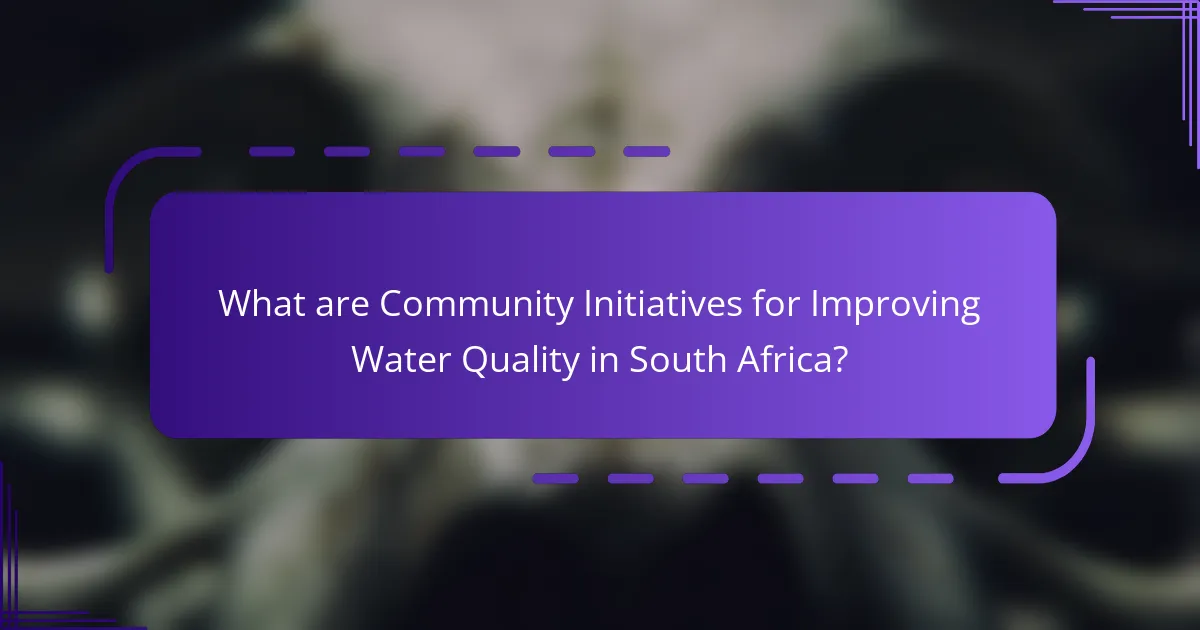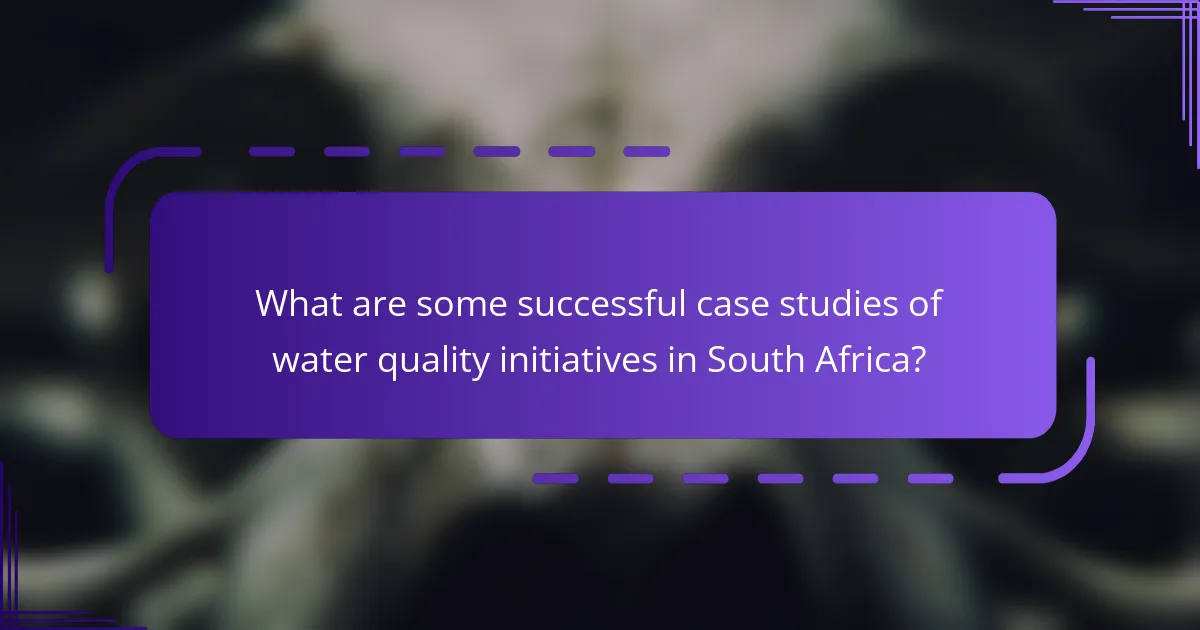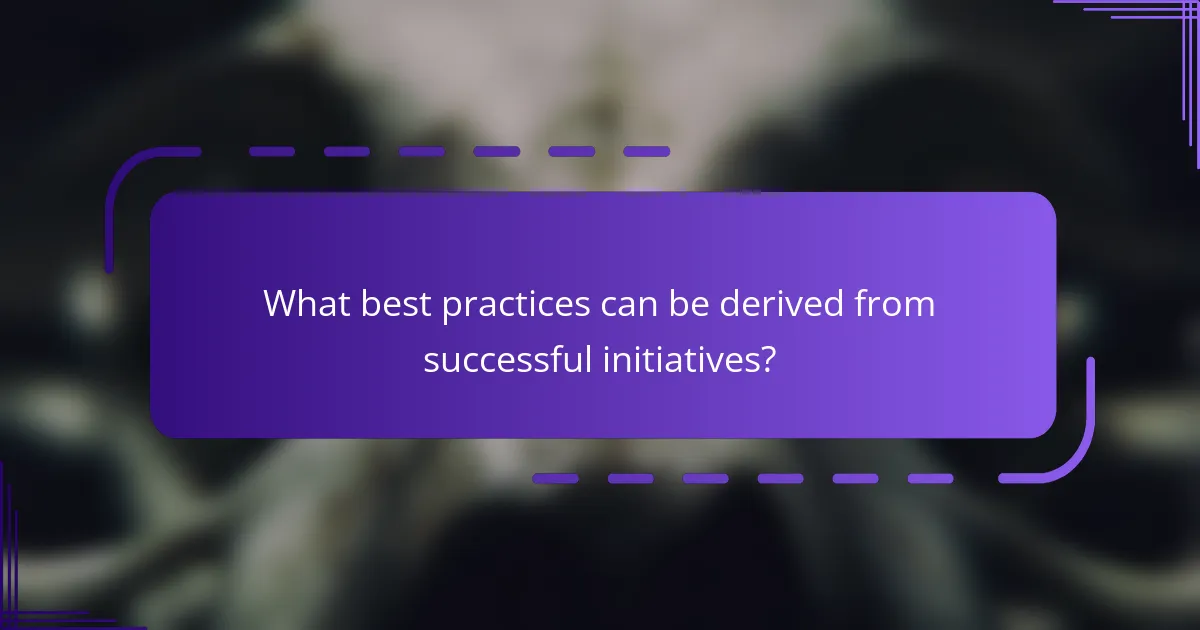Community initiatives aimed at improving water quality in South Africa encompass various local programs focused on education, pollution reduction, and sustainable practices. Key projects include the Water and Sanitation Services project in Cape Town, which empowers communities in managing local water resources, and the Umgeni River Catchment Management project, which involves local stakeholders in water quality monitoring. Successful case studies, such as the Blue Drop Certification Program and the Water and Sanitation Program in the Eastern Cape, highlight effective strategies for enhancing water quality through community engagement and sustainable resource management. Best practices derived from these initiatives emphasize collaboration, local ownership, and long-term sustainability, resulting in measurable improvements in water access and quality across the region.

What are Community Initiatives for Improving Water Quality in South Africa?
Community initiatives for improving water quality in South Africa include various local programs and projects. These initiatives often focus on community education, pollution reduction, and sustainable practices. For example, the Water and Sanitation Services project in Cape Town empowers communities to manage local water resources. Another initiative, the Umgeni River Catchment Management project, involves local stakeholders in monitoring water quality. The South African government also supports initiatives like the National Water Resource Strategy, which emphasizes community involvement. These efforts collectively aim to enhance water quality and ensure sustainable access for all communities.
How do these initiatives address water quality issues?
Community initiatives address water quality issues by implementing localized strategies to monitor and improve water conditions. These initiatives often involve community engagement, where residents participate in water testing and reporting. They promote awareness of pollution sources and encourage practices that reduce contamination. Many programs focus on restoring natural water filtration systems, such as wetlands, to enhance water quality. Educational workshops are conducted to inform residents about safe water practices. Collaborations with local governments ensure that initiatives align with regulatory standards. Evidence shows that these community-led efforts lead to measurable improvements in water quality metrics. For example, a study by the South African Water Research Commission found that community monitoring programs significantly reduced E.coli levels in targeted areas.
What specific problems are these initiatives targeting?
These initiatives are targeting the problem of inadequate access to clean drinking water in South Africa. Many communities face water contamination from agricultural runoff and industrial waste. Additionally, there are issues related to poor sanitation and infrastructure. These factors contribute to waterborne diseases affecting public health. The initiatives aim to improve water quality through community engagement and education. They also focus on sustainable practices to protect water resources. Evidence shows that contaminated water sources lead to increased health risks. Addressing these problems is crucial for community well-being and environmental sustainability.
How do community members participate in these initiatives?
Community members participate in these initiatives through active involvement in planning and implementation. They engage in local meetings to discuss water quality issues. Volunteers often help with clean-up activities in water bodies. Some members contribute by educating others about water conservation practices. Additionally, community members may provide feedback on proposed projects. They also participate in monitoring water quality through collaborative efforts. Local leaders often facilitate these participatory processes. These actions enhance community ownership and accountability in water management initiatives.
Why is improving water quality important for South African communities?
Improving water quality is crucial for South African communities to ensure public health and environmental sustainability. Contaminated water sources lead to widespread health issues such as cholera and diarrhea. According to the World Health Organization, safe drinking water can prevent 1.5 million deaths annually. Clean water also supports agricultural productivity, which is essential for local economies. The South African government has identified water quality improvement as a priority in its National Water Resource Strategy. Access to clean water enhances community well-being and promotes social equity. Therefore, investing in water quality is vital for the overall development of South African communities.
What health benefits are associated with clean water?
Clean water provides numerous health benefits. It prevents waterborne diseases such as cholera and dysentery. Access to clean water reduces the risk of infections. Proper hydration supports overall physical health and cognitive function. Clean water promotes better nutrition by enabling food safety. It also contributes to improved sanitation and hygiene practices. According to the World Health Organization, safe drinking water can reduce diarrheal disease by up to 90%. This highlights the critical role of clean water in public health.
How does water quality impact local economies?
Water quality significantly impacts local economies by influencing public health, agriculture, and tourism. Poor water quality can lead to health issues, increasing healthcare costs for communities. For example, contaminated water sources can cause diseases like cholera, burdening local health systems. This, in turn, affects workforce productivity due to illness.
Moreover, agriculture relies heavily on clean water for irrigation. Contaminated water can reduce crop yields, impacting food supply and local income. A study by the World Health Organization indicates that improved water quality can enhance agricultural productivity by up to 30%.
Tourism is also affected by water quality. Clean lakes and rivers attract tourists, boosting local businesses. Conversely, polluted water bodies deter visitors, leading to economic decline. In South Africa, areas with improved water quality have seen a rise in eco-tourism, benefiting local economies.
Thus, water quality is a crucial factor that directly influences the economic stability and growth of local communities.

What are some successful case studies of water quality initiatives in South Africa?
Successful case studies of water quality initiatives in South Africa include the Blue Drop Certification Program. This initiative, launched by the Department of Water and Sanitation, aims to improve drinking water quality management. It encourages municipalities to meet specific water quality standards. The program has led to significant improvements in water quality in various regions. Another example is the Water and Sanitation Program in the Eastern Cape. This initiative focuses on community engagement and education regarding water conservation and quality. It has resulted in enhanced local water management practices. The Umgeni Water initiative in KwaZulu-Natal has also been successful. It promotes sustainable water resource management through community involvement. These case studies demonstrate effective strategies for improving water quality across South Africa.
How have local communities implemented these initiatives?
Local communities in South Africa have implemented initiatives to improve water quality through collaborative efforts. They engage in awareness campaigns to educate residents about water conservation and pollution prevention. Communities also establish local water committees to oversee water management practices. These committees often conduct regular water quality testing to monitor changes and address issues promptly. Additionally, some communities have adopted rainwater harvesting systems to supplement water supply. They participate in tree planting activities to enhance watershed protection. Community members often collaborate with NGOs and government agencies to secure resources and training. These partnerships help sustain long-term water quality improvement efforts.
What strategies did they use to mobilize community support?
They used community engagement, education, and partnership building to mobilize support. Community engagement involved organizing local meetings to discuss water quality issues. Education programs informed residents about the importance of clean water. Partnerships with local organizations helped leverage resources and expertise. Additionally, they utilized social media to spread awareness and gather support. Surveys were conducted to understand community needs and priorities. This feedback shaped initiatives to ensure they were relevant and effective. These strategies collectively fostered a sense of ownership and responsibility among community members.
What resources were necessary for these initiatives to succeed?
Financial support was necessary for these initiatives to succeed. Funding was required to implement water quality projects effectively. Skilled personnel were essential for executing the initiatives. Community engagement facilitated local participation and ownership of the projects. Infrastructure improvements were needed to enhance water delivery systems. Technical resources, such as water testing kits, ensured accurate monitoring of water quality. Partnerships with local organizations strengthened the initiatives’ reach and impact. Training programs for community members built capacity for sustainable practices.
What lessons can be learned from these case studies?
Community initiatives for improving water quality in South Africa reveal several key lessons. First, collaboration among stakeholders enhances project success. Successful projects often involve local communities, government, and NGOs working together. Second, education and awareness are crucial. Programs that educate communities about water conservation lead to better practices. Third, sustainable practices are essential for long-term impact. Projects that incorporate sustainable techniques see lasting improvements. Fourth, adaptability is important. Initiatives must be flexible to respond to changing community needs. Finally, monitoring and evaluation are vital. Regular assessments help identify areas for improvement and ensure accountability. These lessons demonstrate effective strategies for enhancing water quality through community involvement.
What challenges did communities face during implementation?
Communities faced several challenges during the implementation of water quality initiatives in South Africa. Limited financial resources hindered the ability to invest in necessary infrastructure. Additionally, lack of technical expertise made it difficult to effectively manage water quality projects. Resistance from local stakeholders often stalled progress and created conflicts. Furthermore, inadequate communication led to misunderstandings about project goals and benefits. Environmental factors, such as drought or pollution, complicated implementation efforts. Lastly, regulatory hurdles slowed down the approval processes needed for project execution. These challenges collectively impacted the success of community initiatives aimed at improving water quality.
How were these challenges overcome?
Community initiatives in South Africa overcame challenges through collaboration and education. Local partnerships with government and NGOs facilitated resource sharing. Community training programs increased awareness about water quality issues. Implementation of sustainable practices improved long-term water management. Financial support from international organizations helped fund projects. Monitoring and evaluation processes ensured accountability and effectiveness. Success stories from various regions served as models for replication. These strategies collectively enhanced community resilience and water quality.

What best practices can be derived from successful initiatives?
Best practices derived from successful initiatives include community engagement, collaborative partnerships, and sustainable resource management. Community engagement fosters local ownership and ensures that initiatives meet specific needs. Collaborative partnerships enhance resource sharing and expertise, leading to more effective solutions. Sustainable resource management practices, such as rainwater harvesting and wastewater treatment, promote long-term water quality improvements. Evidence from successful case studies in South Africa indicates that these practices lead to measurable enhancements in water quality and community health outcomes. For instance, initiatives that involved local stakeholders reported a 30% increase in water access and quality.
How can other communities replicate these successful practices?
Other communities can replicate successful practices by adopting a collaborative approach. Engaging local stakeholders is essential for identifying specific water quality issues. Establishing partnerships with NGOs and government agencies can provide necessary resources and expertise. Implementing education and awareness programs raises community involvement and understanding of water quality issues. Utilizing data-driven decision-making helps tailor solutions to local conditions. Regular monitoring and evaluation ensure that practices remain effective and adaptable. Successful case studies, such as those from South Africa, demonstrate the importance of community ownership and sustainable practices in improving water quality.
What steps should communities take to start their own initiatives?
Communities should begin their initiatives by identifying specific water quality issues. They need to gather relevant data on local water sources. Engaging stakeholders, such as residents and local organizations, is crucial. Establishing a clear goal for the initiative will help maintain focus. Communities should develop a detailed action plan outlining steps and resources needed. Securing funding through grants or partnerships is essential for sustainability. Implementing educational programs can raise awareness about water quality. Finally, monitoring progress and adapting strategies based on outcomes is vital for long-term success.
What role does collaboration play in these initiatives?
Collaboration is essential in community initiatives for improving water quality in South Africa. It fosters shared responsibility among stakeholders. This includes local communities, government agencies, and NGOs. Collaborative efforts enhance resource sharing and expertise. They also promote collective problem-solving and innovation. Research shows that partnerships lead to more sustainable outcomes. For example, initiatives that involve multiple stakeholders often achieve better water management practices. Collaboration builds trust and engagement within communities. This results in increased participation and accountability in water quality efforts.
What resources are available for communities looking to improve water quality?
Communities looking to improve water quality can access various resources. Government agencies provide funding and technical assistance for water quality projects. Nonprofit organizations often offer educational materials and training programs on best practices. Local universities may conduct research and provide expertise in water management. Online platforms host toolkits and guidelines for community engagement and project implementation. Collaboration with local stakeholders enhances resource sharing and knowledge exchange. The South African Department of Water and Sanitation offers specific programs aimed at improving water quality at the community level. These resources collectively support community efforts to enhance water quality effectively.
How can communities access funding and support for water initiatives?
Communities can access funding and support for water initiatives through government grants, non-profit organizations, and international aid. Local governments often allocate budgets for water projects, which communities can apply for. Non-profit organizations provide grants specifically aimed at improving water quality and access. International bodies, such as the World Bank, offer funding for sustainable water initiatives. Community involvement is crucial in these applications, as it demonstrates local commitment. Successful case studies in South Africa show that collaborative efforts enhance funding opportunities. For instance, partnerships with universities can strengthen proposals and attract additional resources.
What organizations provide assistance in water quality improvement efforts?
Organizations that provide assistance in water quality improvement efforts include the World Health Organization (WHO), the United Nations Environment Programme (UNEP), and local NGOs such as the South African Water Research Commission (WRC). The WHO focuses on global health standards and guidelines for water quality. The UNEP works on environmental sustainability and water management projects. The WRC conducts research and provides solutions tailored to South African water challenges. These organizations collaborate with communities to enhance water quality and promote sustainable practices.
What practical tips can communities apply to enhance their water quality initiatives?
Communities can enhance their water quality initiatives by implementing regular water testing. This helps identify contaminants and assess overall water safety. Establishing partnerships with local organizations can improve resource sharing and expertise. Engaging residents through education programs raises awareness about pollution sources and prevention. Promoting the use of rainwater harvesting systems reduces reliance on municipal supplies. Implementing waste management strategies minimizes runoff pollution. Advocating for policy changes can lead to better regulatory frameworks for water protection. Lastly, organizing clean-up events fosters community involvement and environmental stewardship.
Community initiatives for improving water quality in South Africa focus on local programs aimed at enhancing water conditions through education, pollution reduction, and sustainable practices. Key initiatives include the Water and Sanitation Services project in Cape Town and the Umgeni River Catchment Management project, which actively involve community members in monitoring and managing water resources. The article explores specific water quality issues, community participation strategies, and successful case studies, highlighting the importance of collaboration and sustainable practices in achieving measurable improvements in water quality and public health. Additionally, it discusses the economic impacts of water quality and offers practical tips for communities looking to implement their own initiatives.